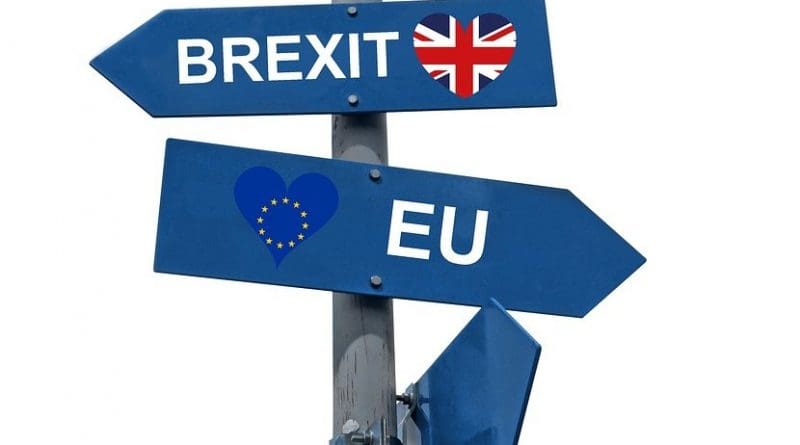Brexit’s Economic And Political Effects A Puzzle For The GCC Too – OpEd
By Arab News
By Manuel Almeida*
The brittle Brexit process is entering a critical phase. This week’s informal European Council meeting in Salzburg — a gathering of all EU leaders except the UK’s — will be a serious test for the Chequers Brexit plan.
Then, between Sept. 23 and 26, the Labour Party will hold its annual conference at a time when pressure is mounting on its leader, Jeremy Corbyn, to back a second Brexit referendum. A week later, it will be the Conservatives’ turn, with hard-Brexiteers such as Boris Johnson set to scold Prime Minister Theresa May over what the former foreign minister and like-minded peers see as too many concessions to Brussels. These five weeks will culminate in the EU summit of Oct. 18 and 19.
Following the Brexit referendum in June 2016, the impression in Gulf capitals, at least initially, was that Brexit represented mostly an opportunity, rather than a potential nuisance. However, for the Arab Gulf states — and for everyone else for that matter — the multitude of known unknowns makes any prediction about Brexit’s various implications a risky guess.
The idea that the departure from the EU will break the UK’s shackles and allow, in May’s own words, a “truly global Britain” to fulfill its missing potential partially explains the Gulf’s initially rosy view of Brexit. The very same week that Article 50 was officially triggered, Qatari Prime Minister Sheikh Abdullah bin Nasser bin Khalifa Al-Thani announced that the Qatar Investment Authority would invest an additional £5 billion ($6.6 billion) in the UK after Brexit. Less than six months after the referendum, the Gulf Cooperation Council-UK summit, held in Bahrain, launched the GCC-UK Strategic Partnership, a special framework for cooperation in areas ranging from trade and defense to the environment.
Deepening trade ties and eventually signing a free trade deal is an obvious place to start in rekindling the old UK-GCC relationship post-Brexit. But it is easier said than done.
One aspect that continues to go underestimated is the complexity and sheer scale of the task required to negotiate new trade deals. Last year, the eruption of the intra-GCC crisis centered on Qatar delayed the talks between the UK and the Gulf bloc. The alternative, to negotiate individual deals with each of the GCC states, is seen by experts as a far more complicated operation.
Plus the UK will only be able to directly negotiate and successfully conclude trade agreements with non-EU members if it leaves the EU’s customs union. It is still unclear how May’s proposal for a revised customs arrangement or partnership will be digested by other EU members.
As far as investment goes, the natural assumption is that, as sterling devalues, UK companies become more attractive for foreign investors and, as London property prices slump, institutional and private investors from the Gulf would feast on the comparatively low-cost opportunities. But, as a piece in the Financial Times noted a few days ago, fears of a foreigners’ shopping spree of important companies could lead to the UK government intervening in various cases — as has been happening in France — to block foreign acquisitions and stop the bleeding. This, in turn, could diminish foreign and particularly Gulf interest in the UK market.
On the opposite side, various British businesses have, over the past year, trimmed or shut down altogether their operations in the Gulf. Some of this has been attributed to fears about the economic prospects at home.
The political dimension of Brexit should worry Gulf governments the most. Even if the UK government and the EU 27 reach an agreement on Brexit, the chances of it not being ratified in the House of Commons are very real. Various Labour figures have already expressed their intention to vote against May’s deal with the EU and a rebellion from hard-core Tory euroskeptics could be decisive. Last week’s meeting of roughly 50 Tory MPs, symbolically held in the Thatcher Room at Westminster’s Portcullis House and organized by the European Research Group, led by Tory euroskeptic Jacob Rees-Mogg, was a clear indication that Conservative hard Brexiteers remain a force to be reckoned with.
A hard Brexit would wreak havoc in the long months required to organize another election or a second referendum. While, according to polls, the result of a second referendum could eventually overturn Brexit, an election could hand the winning ticket to Corbyn, a leader whose preconceptions and ideological contradictions are second to none. The UK’s foreign policy under his populist lenses — Russia and the Iranian and Venezuelan regimes are all in his good graces — would probably spell tricky times ahead for the likes of Saudi Arabia and the UAE.
Electoral considerations have been at the heart of the Brexit conundrum from the outset. In the case of Corbyn, by avoiding adopting a clear position on the matter, the leader of Britain’s pro-EU party was, by default, one of the main architects of Brexit. Now that Brexit is around the corner, the Labour leader is prepared to reject May’s deal with the EU to force an election; in other words, to take the house, burn it down first if need be.
As written in a previous column, be it a “hard” or “soft” Brexit, the UK government will inevitably lose much if not all of its ability to influence EU affairs, perhaps with some exceptions such as defense. This is no small change considering we are talking about the world’s leading economic bloc. The Arab Gulf states would thus lose a particularly willing interlocutor within the EU.
*Manuel Almeida, Ph.D., is a visiting fellow at the Middle East Centre of the London School of Economics and Political Science, where his research focuses on social contract in the Arab state and its impact on governance and sustainable development. He is also partner at Firma, covering emerging markets and geopolitical risk. Twitter: @_ManuelAlmeida

